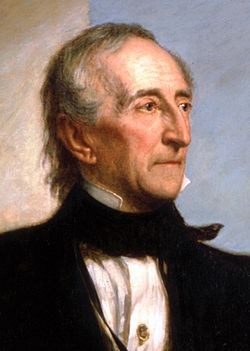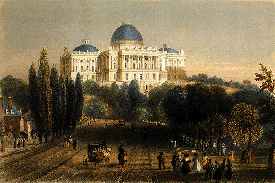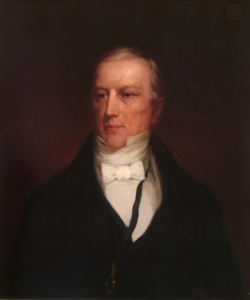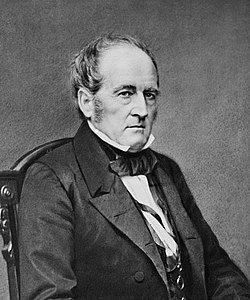Top Qs
Timeline
Chat
Perspective
23rd United States Congress
1833-1835 U.S. Congress From Wikipedia, the free encyclopedia
Remove ads
The 23rd United States Congress was a meeting of the legislative branch of the United States federal government, consisting of the United States Senate and the United States House of Representatives. It met in Washington, D.C. from March 4, 1833, to March 4, 1835, during the fifth and sixth years of Andrew Jackson's presidency. The apportionment of seats in the House of Representatives was based on the 1830 United States census. The Senate had an Anti-Jacksonian or National Republican majority, and the House had a Jacksonian or Democratic majority.
Remove ads
Major events
- March 28, 1834: Senate censured President Andrew Jackson for defunding the Second Bank of the United States
- June 2, 1834: A special election for the House speakership takes 10 ballots.
- January 30, 1835: Richard Lawrence unsuccessfully tried to assassinate President Jackson in the United States Capitol; this was the first assassination attempt against a President of the United States.[1]
Remove ads
Major legislation
Party summary
Summarize
Perspective
The count below identifies party affiliations at the beginning of the first session of this congress. Changes resulting from subsequent replacements are shown below in the "Changes in membership" section.
Senate
House of Representatives
For the beginning of this congress, the size of the House was increased from 213 seats to 240 seats, following the 1830 United States census.[2]
Leadership
Senate

Martin Van Buren
- President: Martin Van Buren (J)
- President pro tempore: Hugh Lawson White (J), until December 15, 1833
- George Poindexter (NR), June 28, 1834 – November 30, 1834
- John Tyler (NR), from March 3, 1835
House of Representatives
- Speaker: Andrew Stevenson (J), until June 2, 1834
Members
Summarize
Perspective
This list is arranged by chamber, then by state. Senators are listed by class, and representatives are listed by district.
Senate
Senators were elected by the state legislatures every two years, with one-third beginning new six-year terms with each Congress. Preceding the names in the list below are Senate class numbers, which indicate the cycle of their election. In this Congress, Class 1 meant their term began with this Congress, requiring reelection in 1838; Class 2 meant their term ended with this Congress, requiring reelection in 1834; and Class 3 meant their term began in the last Congress, requiring reelection in 1836.
Alabama
Connecticut
Delaware
Georgia
Illinois
Indiana
Kentucky
Louisiana
Maine
Maryland
Massachusetts
Mississippi
|
Missouri
New Hampshire
New Jersey
New York
North Carolina
Ohio
Pennsylvania
Rhode Island
South Carolina
Tennessee
Vermont
Virginia
|
 2 Jacksonians
1 Jacksonian and 1 Anti-Jacksonian
2 Anti-Jacksonians
2 Nullifiers |
 Hugh Lawson White  George Poindexter  John Tyler
|
House of Representatives
Remove ads
Changes in membership
Summarize
Perspective
The count below reflects changes from the beginning of the first session of this Congress.
Senate
House of Representatives
- Replacements: 18
- Jacksonian: 1 seat net loss
- National Republican: 1 seat net gain
- Deaths: 8
- Resignations: 15
- Contested election: 1
- Total seats with changes: 23
Remove ads
Committees
Summarize
Perspective
Lists of committees and their party leaders.
Senate
- Agriculture (Chairman: Bedford Brown)
- Amendments to the Constitution (Select)
- Audit and Control the Contingent Expenses of the Senate (Chairman: Nehemiah Knight)
- Claims (Chairman: Samuel Bell)
- Commerce (Chairman: Nathaniel Silsbee)
- Distributing Public Revenue Among the States (Select)
- District of Columbia (Chairman: Ezekiel F. Chambers then John Tyler)
- Engrossed Bills (Chairman: Ether Shepley)
- Establishing Branches of the Mint (Select)
- Executive Patronage (Select)
- Finance (Chairman: Daniel Webster)
- Foreign Relations (Chairman: William Wilkins then Henry Clay)
- French Spoilations (Select)
- Indian Affairs (Chairman: Hugh Lawson White)
- Judiciary (Chairman: John M. Clayton)
- Manufactures (Chairman: Theodore Frelinghuysen)
- Michigan and Arkansas Admission to the Union (Select)
- Mileage of Members of Congress (Select)
- Military Affairs (Chairman: Nathaniel Silsbee)
- Militia (Chairman: John M. Robinson)
- Naval Affairs (Chairman: Samuel Southard)
- Pensions (Chairman: Gideon Tomlinson)
- Post Office and Post Roads (Chairman: Felix Grundy)
- President's Message Refusing to Furnish a Paper to Senate (Select)
- Private Land Claims (Chairman: William Hendricks)
- Public Lands (Chairman: George Poindexter)
- Purchasing Boyd Reilly's Gas Apparatus (Select)
- Revolutionary Claims (Chairman: Gabriel Moore)
- Roads and Canals (Chairman: William Hendricks)
- Shiloh National Park (Select)
- Tariff Regulation (Select)
- Whole
House of Representatives
- Accounts (Chairman: Joel K. Mann)
- Agriculture (Chairman: Abraham Bockee)
- Bank of the United States (Select)
- Biennial Register (Select)
- Boundary of the Chickasaw Indians (Select)
- Claims (Chairman: Elisha Whittlesey)
- Commerce (Chairman: Joel B. Sutherland)
- District of Columbia (Chairman: Joseph Chinn)
- Elections (Chairman: Nathaniel Claiborne)
- Establishing an Assay Office in the Gold Region (Select)
- Expenditures in the Navy Department (Chairman: Joseph Hall)
- Expenditures in the Post Office Department (Chairman: Albert G. Hawes)
- Expenditures in the State Department (Chairman: Augustine Henry Shepperd)
- Expenditures in the Treasury Department (Chairman: Heman Allen)
- Expenditures in the War Department (Chairman: Frederick Whittlesey)
- Expenditures on Public Buildings (Chairman: Reuben Whallon)
- Foreign Affairs (Chairman: William S. Archer then John Young Mason)
- Foreign Relations (Chairman: William S. Archer then John Young Mason)
- Indian Affairs (Chairman: Dixon H. Lewis)
- Invalid Pensions (Chairman: Tristam Burges)
- Judiciary (Chairman: John Bell then Thomas F. Foster)
- Manufactures (Chairman: John Quincy Adams)
- Military Affairs (Chairman: Richard M. Johnson)
- Naval Affairs (Chairman: Campbell P. White)
- Post Office and Post Roads (Chairman: Henry W. Connor)
- Private Land Claims (Chairman: Cave Johnson)
- Public Expenditures (Chairman: Thomas Davenport)
- Public Lands (Chairman: Clement C. Clay)
- Revisal and Unfinished Business (Chairman: John Dickson)
- Revolutionary Claims (Chairman: Henry A. P. Muhlenberg)
- Revolutionary Pensions (Chairman: Daniel Wardwell)
- Roads and Canals (Chairman: Charles F. Mercer)
- Rules (Select)
- Standards of Official Conduct
- Territories (Chairman: Lewis Williams)
- Ways and Means (Chairman: James K. Polk)
- Whole
Joint committees
Remove ads
Employees
Senate
- Secretary: Walter Lowrie
- Sergeant at Arms: Mountjoy Bayly, until December 9, 1833
- John Shackford, elected December 9, 1833
- Chaplain: Charles C. Pise (Roman Catholic), until December 10, 1833
- Frederick W. Hatch (Episcopalian), elected December 10, 1833
House of Representatives
- Clerk: Matthew St. Clair Clarke, until December 2, 1833
- Walter S. Franklin, elected December 2, 1833
- Sergeant at Arms: John O. Dunn, until December 6, 1833
- Thomas B. Randolph, elected December 6, 1833
- Doorkeeper: Overton Carr
- Postmaster: William J. McCormick
- Reading Clerks: [data missing]
- Chaplain: William H. Hammett (Methodist), until December 9, 1833
- Thomas H. Stockton (Methodist), elected December 9, 1833
- Edward D. Smith (Presbyterian), elected December 10, 1834
Remove ads
See also
- 1832 United States elections (elections leading to this Congress)
- 1834 United States elections (elections during this Congress, leading to the next Congress)
Notes
- When seated or oath administered, not necessarily when service began.
References
External links
Wikiwand - on
Seamless Wikipedia browsing. On steroids.
Remove ads







